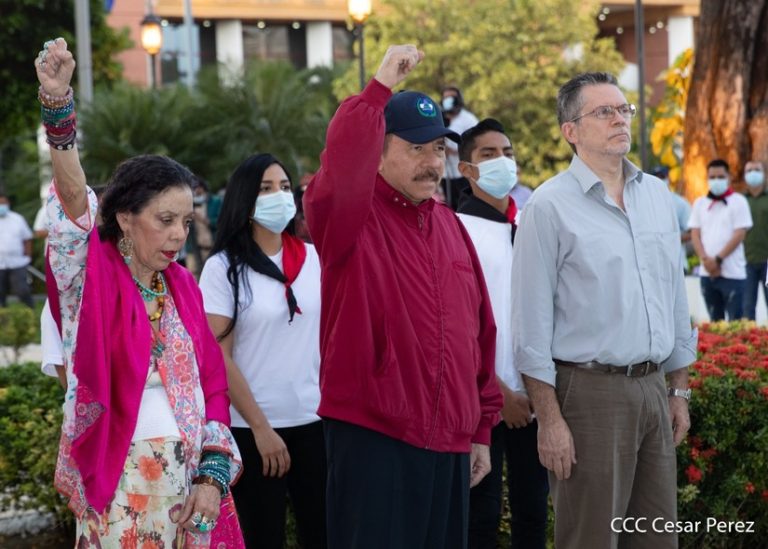13 de julio 2021

The Return of the Military

PUBLICIDAD 1M
PUBLICIDAD 4D
PUBLICIDAD 5D
The complicity of the ruling leadership: Ministers, deputies, generals, magistrates, mayors, and Sandinista businessmen

Last week, 629 of the 688 European Parliament deputies (over 90%) representing all the political currents, including the Social Democratic left, approved a resolution condemning the Ortega-Murillo dictatorship. The resolution will be taken up by the foreign ministers of the 27 governments that make up the European Union.
The resolution asks the European governments to follow the money trail of the presidential family’s corruption, and that of the regime’s chief operators. It also demands freedom for all the political prisoners, in order to clear the way for an electoral reform.
On the contrary, if there aren’t free elections in Nicaragua on November 7th; if Ortega persists in his current path of reelection without democracy and without political competition, in 2022, the Nicaraguan government won’t obtain the political and diplomatic recognition of the European countries.
This is that same warning that the majority of the governments on the American continent already issued, when the OAS voted to condemn the grave human rights abuses perpetrated by the regime, demanding free, transparent and competitive elections in Nicaragua.
However, the November 7 elections have already been obliterated, due to Ortega’s and Murillo’s fears of submitting to the popular will. They’ve refused to permit an electoral reform that could restore voters’ trust in the system.
The elections were stillborn, condemned to death from the moment the regime enhanced the police state that prevents freedom of assembly and mobilization. The ruling party then approved four laws that inhibit their electoral opponents, and abducted and imprisoned six presidential candidates and fourteen opposition leaders, all in order to eliminate their political competition.
Hence, on November 7th in Nicaragua, the voting will take place with the candidates and parties Ortega has allowed. But there won’t be an election in which their power is at stake, nor one where the sovereign will of the citizens decides the direction the country will go in.
After the fiasco of the national dialogues in May 2018 and June 2019, in which the regime never agreed to negotiate an electoral reform, Ortega hastened to bury the November elections. His objective is to forcefully impose five more years of dictatorship on the country, even though in doing so he must launch his own government into the abyss of national and international illegitimacy.
At this stage of the national political crisis, after the April 2018 massacre and three consecutive years of economic recession, there’s no longer any doubt that the presidential couple are willing to pay any price to hold onto power, including the economic and social destruction of the country. But the high government echelons – the ministers and deputies, the Army generals and Police chiefs; the magistrates of the state powers; the mayors and ambassadors; and the Sandinista-allied business owners – should all be warned that they, too, will be governing without legitimacy.
Those who make up the governing elite should be asking themselves now – and not after November 7th – Which of the world’s governments are going to recognize the Ortega-Murillo dictatorship in 2022? Besides Putin’s Russia and his puppet governments in Southern Ossetia, Abkhazia and Crimea, there’s Iran, North Korea and Taiwan, plus Ortega’s ideological allies in Latin America: Venezuela, Cuba, Bolivia, and St. Vincent and the Grenadines. What other governments would confer any legitimacy on the dictator’s reelection?
Ortega and Murillo’s totalitarian drift, and their violation of international agreements signed by the government, is leading to the regime’s exclusion from the principal international organizations, including multilateral and regional credit organizations. This could have devastating effects on the stability of their own government.
That’s what they should be weighing – “they” meaning not Ortega and Murillo, but their ministers and magistrates, their generals and business owners, who are entering into deliberate complicity by submitting to the ambition of a family dictatorship that could prolong the regime’s agony for a time, but not resolve its terminal crisis.
The future of Nicaragua after 2022 is marked by the infeasibility of a pariah government that lacks international legitimacy. A political regime that can only become more repressive, without freedoms or democracy, and that sooner rather than later will end up derailing the economy, provoking more emigration and aggravating the regional crisis.
With the political opposition and civil society truncated, their leaders imprisoned, it’s imperative that the voices of private sector leadership be heard – the large business owners and the business associations, along with the bishops of the Catholic Church. Without free elections on November 7, with five more years of dictatorship… What future awaits Nicaragua in 2022?
This article was originally published in Spanish in Confidencial and translated by Havana Times
Archivado como:
PUBLICIDAD 3M
Periodista nicaragüense, exiliado en Costa Rica. Fundador y director de Confidencial y Esta Semana. Miembro del Consejo Rector de la Fundación Gabo. Ha sido Knight Fellow en la Universidad de Stanford (1997-1998) y profesor visitante en la Maestría de Periodismo de la Universidad de Berkeley, California (1998-1999). En mayo 2009, obtuvo el Premio a la Libertad de Expresión en Iberoamérica, de Casa América Cataluña (España). En octubre de 2010 recibió el Premio Maria Moors Cabot de la Escuela de Periodismo de la Universidad de Columbia en Nueva York. En 2021 obtuvo el Premio Ortega y Gasset por su trayectoria periodística.
PUBLICIDAD 3D